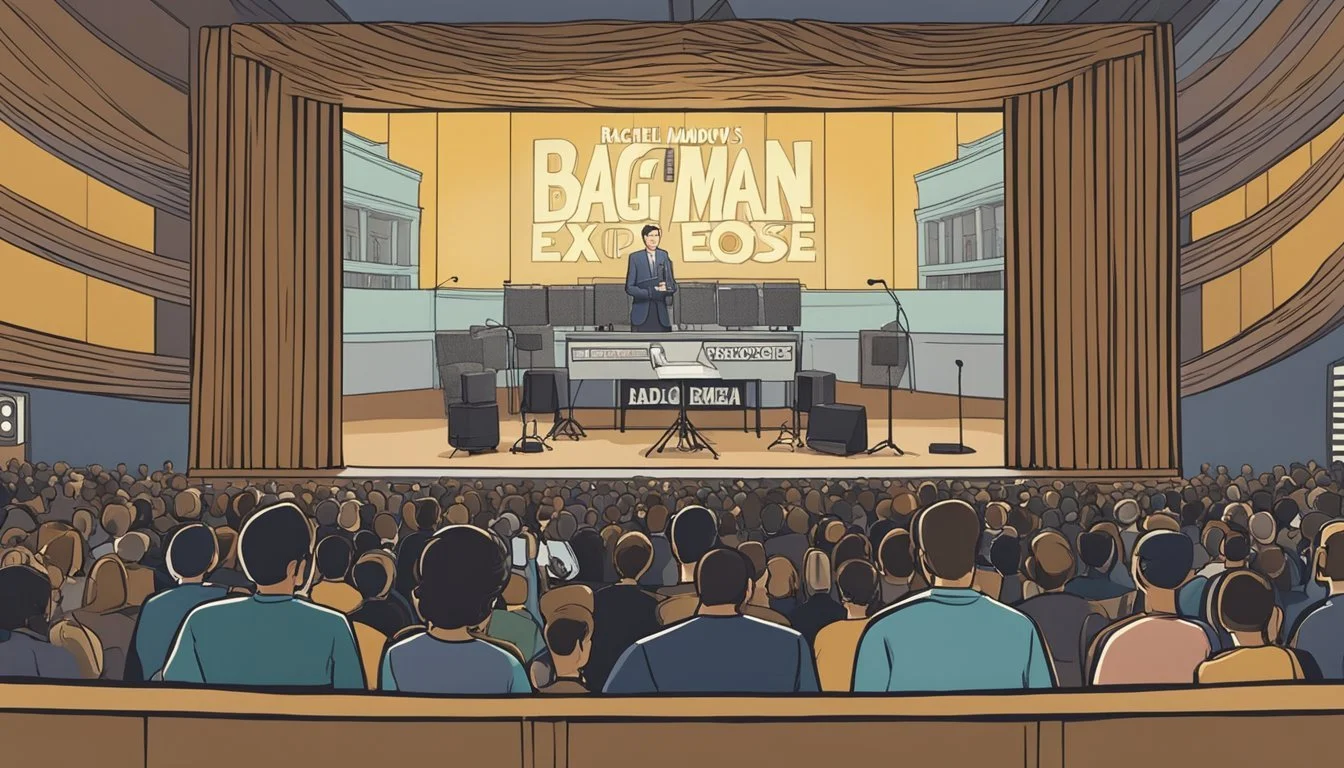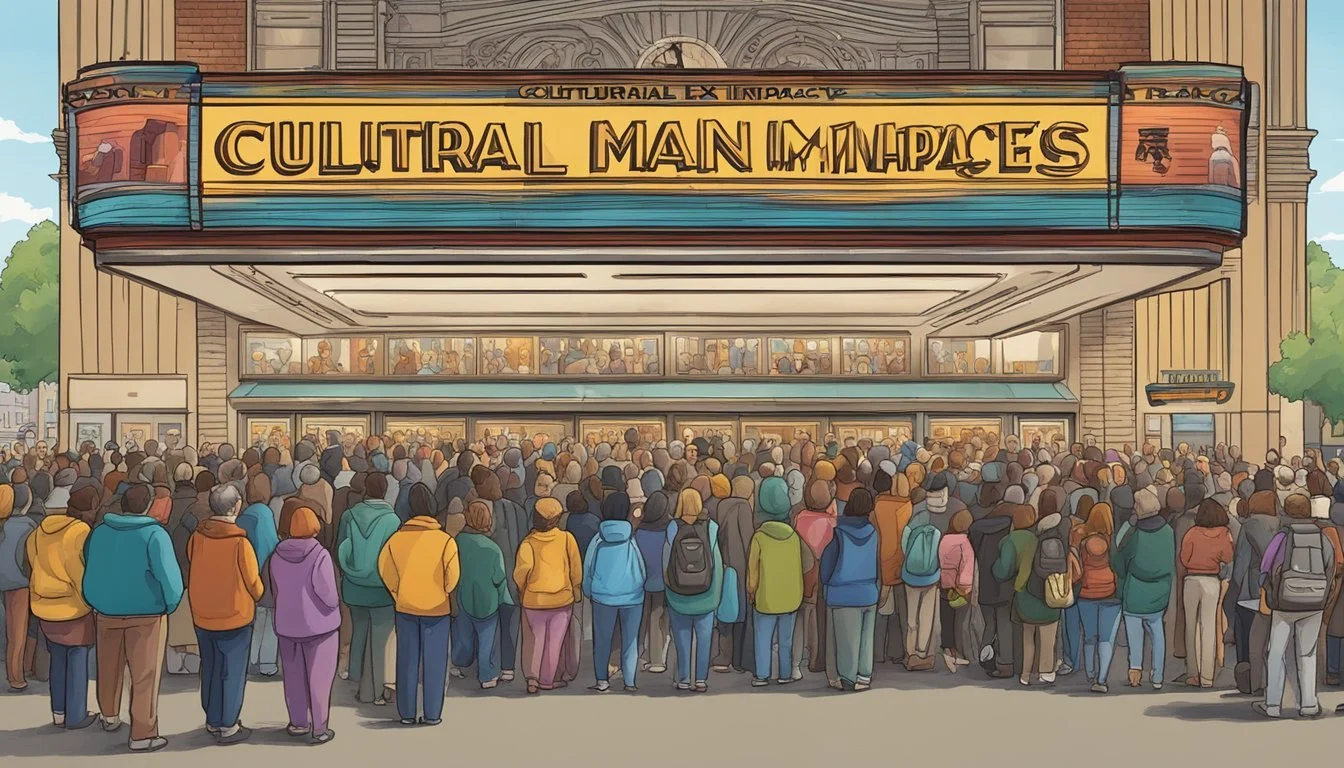Bag Man: Rachel Maddow's Audio Exposé Heads to the Big Screen
Political Scandal Documentary Adaptation
Rachel Maddow's acclaimed podcast "Bag Man" is making the leap from audio to visual storytelling. The series, which delves into the corruption scandal surrounding Richard Nixon's vice president Spiro Agnew, captivated listeners with its blend of political intrigue and historical revelations.
The adaptation of "Bag Man" to film promises to bring this gripping tale of political malfeasance to a wider audience. Maddow's podcast, praised for its investigative depth and narrative style, explored how Agnew ran a bribery and extortion scheme from the White House. The story's transition to the big screen offers an opportunity to visually recreate the tense atmosphere of 1970s Washington.
As the project moves forward, fans of the podcast and history buffs alike eagerly anticipate how the film will portray the complex web of characters and events. The "Bag Man" movie has the potential to shed new light on a pivotal moment in American political history, making it accessible to those who may not have heard the original audio series.
Origins of 'Bag Man'
Rachel Maddow's 'Bag Man' podcast delved into a forgotten scandal from American political history. The series explored Vice President Spiro Agnew's secret criminal enterprise and its eventual exposure.
Podcast Genesis
MSNBC's Rachel Maddow launched 'Bag Man' as her first original podcast in 2018. The series aimed to uncover a largely overlooked chapter of American history. Maddow and her team spent months researching and piecing together the story of Spiro Agnew's downfall.
The podcast's name refers to the literal bags of cash delivered to Agnew. These payments were part of a bribery and extortion scheme he ran while in office. Maddow's investigative approach brought this forgotten tale back into the public eye.
Historical Context
'Bag Man' focused on events from 1973, during Richard Nixon's presidency. At the time, the Watergate scandal dominated headlines and public attention. This overshadowed the simultaneous investigation into Vice President Agnew's criminal activities.
The podcast revealed how Agnew accepted bribes in the White House itself. It detailed the efforts of young federal prosecutors to bring him down. Maddow's series highlighted the relevance of this historical episode to contemporary politics.
By exploring this lesser-known scandal, 'Bag Man' shed light on a crucial moment in American political history. It demonstrated how close the country came to a unprecedented constitutional crisis.
Main Characters
Spiro Agnew and the prosecutors who pursued him are central figures in the Bag Man story. Their actions and motivations drive the narrative of corruption and justice in the Nixon White House.
Spiro Agnew's Profile
Spiro Agnew served as the 39th Vice President of the United States under Richard Nixon from 1969 to 1973. Known for his fiery rhetoric and staunch conservatism, Agnew rose quickly through the political ranks.
Born in Baltimore to Greek immigrant parents, he entered politics in 1962 as Baltimore County Executive. Agnew became Governor of Maryland in 1967 and caught Nixon's attention as a potential running mate.
As Vice President, Agnew gained notoriety for his harsh criticism of political opponents and the media. Behind his public persona, however, lurked a history of corruption dating back to his time in Maryland politics.
The Prosecutors
The team of prosecutors who took on Agnew's case played a crucial role in exposing high-level corruption. U.S. Attorney George Beall led the investigation, supported by young prosecutors Barney Skolnik and Tim Baker.
These lawyers faced immense pressure as they built their case against a sitting Vice President. They navigated complex legal and political terrain, gathering evidence of Agnew's bribery schemes from his time as Maryland governor.
The prosecutors' determination to follow the evidence, regardless of political consequences, was instrumental in Agnew's eventual resignation. Their work set important precedents for holding high-ranking officials accountable for criminal acts.
The Transition to Film
Rachel Maddow's hit podcast "Bag Man" is making the leap from audio to visual storytelling. The political scandal exposé will soon grace cinema screens, bringing its gripping narrative to a wider audience.
Adaptation Process
Focus Features acquired the rights to adapt "Bag Man" into a feature film. The transition involves translating the audio format into a visual medium, requiring significant creative decisions. Screenwriters must distill the podcast's extensive content into a cohesive screenplay, balancing historical accuracy with cinematic storytelling.
The adaptation process aims to capture the podcast's investigative spirit while adding visual elements to enhance the narrative. This includes dramatizing key events and potentially incorporating archival footage to maintain authenticity. The challenge lies in preserving the podcast's informative nature while crafting an engaging film experience.
Creative Team
Ben Stiller has been tapped to direct the "Bag Man" film adaptation. His involvement brings a seasoned filmmaker's perspective to the project. Stiller's previous work in both comedy and drama positions him well to handle the complex tone of the source material.
The creative team will likely include historical consultants to ensure accuracy in portraying the 1970s political landscape. Casting decisions will be crucial, as actors must convincingly portray real-life figures central to the scandal.
Maddow's involvement in the film adaptation remains to be seen, but her expertise could prove valuable in maintaining the story's integrity. The production team faces the task of bringing the authoritarian movement and political intrigue of the era to life on the big screen.
The Political Landscape
Political bribery scandals have shaped American democracy for generations. Their impacts continue to reverberate through contemporary politics, influencing public trust and governmental reforms.
Historical Political Bribery Scandals
The Spiro Agnew case stands out as a landmark political bribery scandal. As Vice President under Richard Nixon, Agnew accepted kickbacks from contractors during his time as Baltimore County Executive and Governor of Maryland. This scheme continued into his vice presidency.
Other notable scandals include the Teapot Dome affair of the 1920s and Abscam in the late 1970s. These incidents exposed vulnerabilities in the political system and led to calls for reform.
Bribery scandals have not been limited to federal offices. State and local politicians have also faced corruption charges, eroding public trust at multiple levels of government.
Impact on Contemporary Politics
Political bribery scandals have led to significant changes in American politics. Ethics reforms, increased transparency measures, and stricter campaign finance laws have been implemented in response to high-profile corruption cases.
The media's role in exposing political corruption has grown, with investigative journalism playing a crucial part in uncovering wrongdoing. This has increased public awareness and scrutiny of political figures.
Scandals have also influenced voter behavior and election outcomes. Corruption allegations can damage a politician's career and their party's reputation, potentially swinging elections.
Anti-corruption platforms have become more prominent in political campaigns. Candidates often emphasize their commitment to integrity and transparency to appeal to voters disillusioned by past scandals.
How to Engage
Rachel Maddow's "Bag Man" podcast offers multiple ways for listeners to access and support the project. Fans can easily subscribe to receive new episodes and contribute to the ongoing success of this investigative audio series.
Subscribing to Content
MSNBC provides several options for accessing "Bag Man" episodes. Listeners can subscribe through popular platforms like Apple Podcasts, ensuring automatic downloads of new content. The MSNBC app also offers a convenient way to stream episodes on mobile devices. For those preferring a direct approach, an RSS feed is available to add to podcast aggregators. This flexibility allows fans to choose their preferred method of staying up-to-date with the series.
Supporting the Project
Engaging with "Bag Man" goes beyond listening. Fans can support the podcast by leaving ratings and reviews on platforms like Apple Podcasts, increasing its visibility to potential new listeners. Sharing episodes on social media helps spread awareness. For those wishing to contribute financially, MSNBC may offer options such as premium subscriptions or merchandise. These support methods help ensure the continued production of high-quality investigative content like "Bag Man".
The Symbiosis of Media
Rachel Maddow's "Bag Man" showcases the interconnected nature of modern media. The project demonstrates how different platforms can amplify and enrich storytelling across multiple formats.
Extending the Conversation
The "Bag Man" podcast sparked discussions beyond its audio format. MSNBC Premium featured segments related to the series on the Rachel Maddow Show. These television segments allowed Maddow to highlight key aspects of the story for a broader audience.
Press coverage of the podcast generated additional interest. News articles and interviews with Maddow brought attention to the historical events covered in "Bag Man." This media coverage helped expand the reach of the story to those who may not have initially listened to the podcast.
Supplementary Content and Discussions
The podcast episodes served as a foundation for additional content. Online forums and social media platforms became spaces for listeners to debate and analyze the information presented.
MSNBC created companion pieces, including articles and video clips, to complement the audio narrative. These supplementary materials provided visual context and additional details not included in the podcast episodes.
Maddow participated in Q&A sessions and live events related to "Bag Man." These interactions allowed fans to engage directly with the creator and delve deeper into the subject matter. The multi-platform approach ensured that the story remained relevant and accessible across various media channels.
Behind the Scenes
The transition of "Bag Man" from podcast to film involved intricate creative decisions and production hurdles. Key figures like Isaac-Davy Aronson and Mike Yarvitz played crucial roles in shaping the project's evolution.
Creative Insights
Rachel Maddow collaborated closely with Isaac-Davy Aronson and Mike Yarvitz to adapt the podcast's narrative structure for the screen. The team focused on visual storytelling techniques to complement the audio-centric approach of the original series.
They incorporated archival footage and photographs to bring historical events to life. Dramatic reenactments were carefully crafted to maintain authenticity while engaging viewers visually.
The writers faced the challenge of condensing hours of podcast material into a cohesive film script. They prioritized key moments and characters to create a compelling cinematic experience.
Production Challenges
Filming during the COVID-19 pandemic presented unique obstacles for the "Bag Man" production team. Safety protocols necessitated creative solutions for scenes involving multiple actors.
Recreating the 1970s era required meticulous attention to detail in set design, costumes, and props. The production designer worked closely with historical consultants to ensure accuracy.
Securing rights to archival materials proved time-consuming and costly. The team had to navigate complex legal agreements to use certain news footage and photographs.
Sound design played a crucial role in translating the podcast's audio atmosphere to film. Audio engineers worked to blend original recordings with newly created soundscapes.
Cultural Impact and Legacy
"Bag Man" exposed a lesser-known political scandal, reshaping public understanding of corruption in American politics. The podcast and subsequent book highlighted the importance of investigative journalism and historical analysis.
Influence on Public Perception
"Bag Man" brought attention to Spiro Agnew's corruption, a story overshadowed by Watergate. The series revealed the extent of bribery and extortion at the highest levels of government, challenging assumptions about political integrity.
Rachel Maddow's storytelling made complex legal and political concepts accessible to a wide audience. This increased public awareness of the Justice Department's role in investigating high-ranking officials.
The podcast's success demonstrated the power of audio storytelling in educating the public about historical events with contemporary relevance.
Educational Value
"Bag Man" served as a case study in political corruption, offering insights into the workings of the U.S. government. It highlighted the crucial role of federal prosecutors in upholding the rule of law, even when facing powerful adversaries.
The series provided a detailed look at investigative techniques used by law enforcement agencies. This educational aspect inspired discussions in classrooms and among legal professionals about ethics in public office.
By connecting past events to current political issues, "Bag Man" encouraged critical thinking about the enduring challenges of governance and accountability in American democracy.
Extended Universe
Rachel Maddow's "Bag Man" has inspired related content and sparked interest in potential future projects. The podcast's success has led to explorations of similar historical events and contemporary political issues.
Related Podcasts and Series
Rachel Maddow Presents: Déjà News examines historical events with parallels to current headlines. This podcast series builds on the investigative style of "Bag Man" while focusing on different topics.
Velshi Banned Book Club, hosted by Ali Velshi, explores controversial literature and censorship issues. While not directly related to "Bag Man," it shares MSNBC's commitment to in-depth analysis of complex topics.
Dateline NBC, a long-running true crime series, occasionally covers political scandals. Its extensive archive includes episodes that complement the themes explored in "Bag Man."
Future Developments
Discussions about adapting "Bag Man" into a television series or documentary film have emerged. These potential projects would bring the story of Spiro Agnew's corruption to a wider audience.
Rachel Maddow's production company has expressed interest in developing more historical podcasts. These could explore other lesser-known political scandals or events that have shaped modern American politics.
Collaborations between Maddow and other journalists or historians may result in new investigative projects. These partnerships could lead to fresh perspectives on political corruption and accountability.









